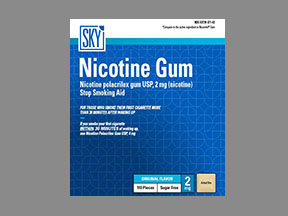
Nicorette Coupons & Savings Card – Discount Prices from $16.02
Brand for: Nicotine polacrilex
My prescription
Edit
2MG, Nicotine Polacrilex (100 Gums)
Select pharmacy

Walgreens
$16.02
COUPON PRICE
Albertsons
$25.52
COUPON PRICE
Walmart
$37.21
COUPON PRICENicorette savings card
Show this card to your pharmacist
Walgreens
$16.02
BIN
ID
PCN
GRP
011867
LH659CC572
HT
LABH001
Powered by
Related nicotine agonists prescriptions
More prescriptions for smoking cessation
Related nicotine agonists prescriptions
More prescriptions for smoking cessation
Price history for Nicorette (brand) & Nicotine Polacrilex (generic)
100 Gums, 2MG
Average retail price for Nicorette
Average retail price for Nicotine Polacrilex
Average SaveHealth price for Nicotine Polacrilex
Our price history data is based on aggregated prescription data collected from participating pharmacies in America. Our prescription data updates daily to reflect the latest price changes. If you notice a missing data point, it means there wasn't sufficient data available to generate a monetary value for that date.
Over the last 12 months, the average discount price of Nicorette is $21.68 using the SaveHealth savings card. That's an average savings of 54.55% on Nicorette with our discount card.
*Retail prices are based on pharmacy claims data, and may not be accurate when we don't have enough claims.
Nicorette (Nicotine Polacrilex) dosage forms
Dosage Quantity Price from Per unit 2MG 100 Gums $30.00 $0.30 2MG 10 Gums $11.10 $1.11 2MG 20 Gums $13.20 $0.66 2MG 40 Gums $17.40 $0.43 2MG 50 Gums $19.50 $0.39 2MG 110 Gums $32.10 $0.29 2MG 120 Gums $34.20 $0.28 2MG 160 Gums $42.60 $0.27 2MG 170 Gums $44.70 $0.26 2MG 220 Gums $55.20 $0.25
| Dosage | Quantity | Price from | Per unit |
|---|---|---|---|
| 2MG | 100 Gums | $30.00 | $0.30 |
| 2MG | 10 Gums | $11.10 | $1.11 |
| 2MG | 20 Gums | $13.20 | $0.66 |
| 2MG | 40 Gums | $17.40 | $0.43 |
| 2MG | 50 Gums | $19.50 | $0.39 |
| 2MG | 110 Gums | $32.10 | $0.29 |
| 2MG | 120 Gums | $34.20 | $0.28 |
| 2MG | 160 Gums | $42.60 | $0.27 |
| 2MG | 170 Gums | $44.70 | $0.26 |
| 2MG | 220 Gums | $55.20 | $0.25 |
| 2MG | 240 Gums | $59.40 | $0.25 |
| 4MG | 10 Gums | $11.53 | $1.15 |
| 4MG | 20 Gums | $14.06 | $0.70 |
| 4MG | 40 Gums | $19.12 | $0.48 |
| 4MG | 50 Gums | $21.65 | $0.43 |
| 4MG | 100 Gums | $34.30 | $0.34 |
| 4MG | 110 Gums | $36.83 | $0.34 |
| 4MG | 160 Gums | $49.48 | $0.31 |
| 4MG | 170 Gums | $52.01 | $0.31 |
| 4MG | 220 Gums | $64.66 | $0.29 |
| 4MG | 240 Gums | $69.72 | $0.29 |
Is Nicorette safer than smoking?
Nicorette, a nicotine replacement therapy, is generally considered safer than smoking cigarettes. While it still delivers nicotine, it does not contain the harmful tar and many of the toxic chemicals found in cigarette smoke. This makes it a safer option for those looking to quit smoking. However, it is important to use Nicorette as directed and consult with a healthcare professional for personalized advice.
What are the side effects of Nicorette?
Nicorette, a nicotine replacement therapy, may cause side effects such as mouth or throat irritation, hiccups, nausea, and heartburn. Some individuals might experience headaches, dizziness, or an upset stomach. In rare cases, it can lead to more serious side effects like an irregular heartbeat or allergic reactions. It's important for individuals to consult with a healthcare provider if they experience any severe or persistent side effects.
Is Nicorette gum as bad as smoking?
Nicorette gum is not as harmful as smoking. While it does contain nicotine, it lacks the harmful tar and many of the toxic chemicals found in cigarette smoke. Nicorette gum is often used as a smoking cessation aid to help individuals reduce their dependence on nicotine and eventually quit smoking. However, it is important to use it as directed and under the guidance of a healthcare professional.
What does Nicorette gum do to your body?
Nicorette gum delivers a controlled amount of nicotine to the body to help reduce withdrawal symptoms and cravings associated with quitting smoking. It works by providing a substitute source of nicotine, which helps to gradually wean the body off its dependence on nicotine from cigarettes. This can aid individuals in their efforts to quit smoking by managing the physical aspects of nicotine addiction.
